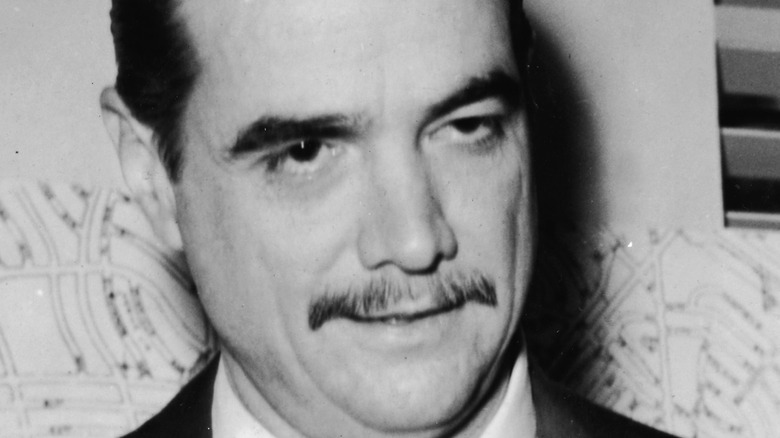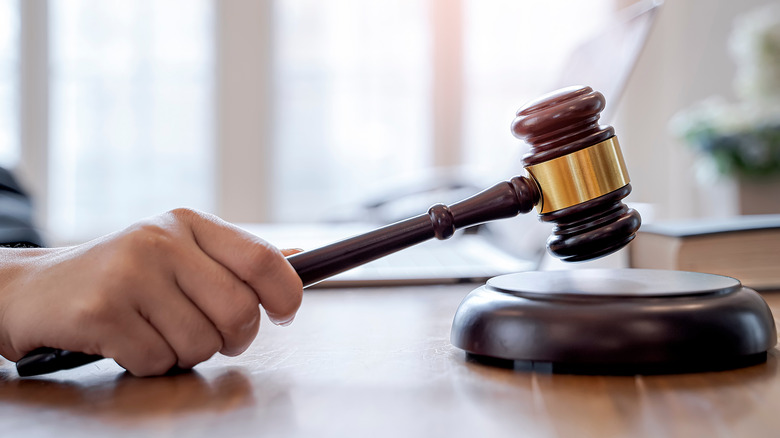Here's Who Inherited Howard Hughes' Fortune After His Death
Howard Hughes used to be one of the richest men in the world. When he died in 1976, he threw the United States court systems into a tizzy, because he died without leaving any kind of will and testament.
Biography reports that Howard Hughes was born in 1905, and just four years later, his father invented an oil drilling tool that made the family incredibly wealthy. Hughes' parents died while he was still young, but Hughes ran the family business well, growing its net worth into the billions. Hughes later moved into Hollywood. There, he dated Katharine Hepburn in the 1930s, according to Reuters, and, per Biography, he produced a little movie called "Scarface," along with lots of other movies he worked on which became a bane to censors.
But that all changed after a devastating 1946 plane crash. Hughes became excessively private after the accident, and reportedly had obsessive compulsive disorder and began using drugs. Hughes was almost never seen publicly for decades, even after the billionaire bought RKO Studios in the late 1930s. His reclusiveness meant that rumors swirled around him in life and in death — after Hughes died, several fake versions of his will circulated. The Wall Street Journal reports that Hughes wasn't married when he died, and he isn't known to have fathered any children, which complicated the matter further. Was Hughes' will ever found? And where did the wealthy businessman's money go after his death?
Splitting up casinos, airplanes, and other assets
Per ABC 13, immediately after Hughes' death was announced in 1976, the press flocked to Houston, Texas. A small group of reporters was able to view Hughes's body, but he was almost unrecognizable to them, since he had been out of the public eye for so long. He was buried at Houston's Glenwood Cemetery. It would then be five more years until the questions around his final will were finalized, reports The Washington Post. According to WREG in Memphis, no one could find Howard Hughes's will, which would be shocking for someone with such a huge fortune. According to The Wall Street Journal, Hughes's estates included land that he owned, multiple airplanes, seven casino properties, a helicopter manufacturer, and a bag of casino chips.
The Washington Post reports that the Harris County Probate Court in Texas took seven weeks to hear testimony before dividing up Hughes' massive fortune. Leaving behind $500 million, plus properties, is no small sum, and Hughes had plenty of people to divide it between.
People claimed to be Howard Hughes' relatives
The Washington Post reports that no fewer than 600 people suddenly came out of the woodwork upon Hughes' death. Many claimed to be his relatives, and many showed up to court in person. Others mailed stacks of letters to the Hughes legal team. Some people claimed they were cousins or sisters. And then there was the woman who claimed to be Hughes' biological mother, even though his mom had actually died long ago. Wearing a two-tone wig, a Confederate flag jacket, two pairs of glasses, and a straw hat with colorful feathers in it, the woman testified that she was absolutely Hughes' mother. The judge dismissed her, as well as numerous other women who insisted they had married Hughes at one point, even though none had identification to back up such a claim.
One woman tried to claim that she and Hughes had a child together when she was 64, and she also insisted that Hughes had a peg leg and had a team of little people who worked for him. Like the others before her, the judge threw wacky claim after wacky claim out of court.
WREG reports that a forged document circulated at one point: a man claimed he met Howard Hughes in 1967 when he pulled onto the side of a Nevada highway for a bathroom break. Melvin Dummar said that Hughes looked disheveled and just wanted a ride to Las Vegas.
Would Hughes' money go to the Latter-day Saints church?
The tale was later turned into an award-winning movie titled "Melvin and Howard," but unfortunately for Melvin Dummar, the fake will he produced after Hughes's death got him into hot water in the courtroom (via WREG). The faux will said that Hughes' fortune should be divided between the Church of Jesus Christ of Latter-day Saints and Dummar, giving Dummar 1/16th of the Hughes estate. The court saw through the forgery and rejected Dummar's claim.
But other claims held more weight, according to The Washington Post. People showed up claiming to be the first, second, third, fourth, and fifth cousins of Hughes — which of them should be able to claim their part of the fortune?
The Hughes case reached the Supreme Court twice. In 1978, the court ruled that Texas and California, which wanted to tax Hughes properties, were denied, since their states say a person can only have one official home at a time (via Find Law). In 1982, the two states brought a case again, which was rejected by the Supreme Court and sent to federal district court instead.
In 2010, the estate is finally settled
Hughes' uncle's stepdaughter, Avis Hughes McIntyre, and her brother's heirs, each received 4.75% of the estate, reports The Washington Post. Hughes' uncle's three granddaughters also got portions of his fortune: Chris Roberts, Beth DePould, and Barbara Cameron were each bequeathed 6.33% of the Hughes fortune, about $32 million. A pretrial agreement meant that Hughes' 16 cousins were given 71.5% of the estate. The amount was life-changing. Chris Roberts had never met Howard Hughes, but she joked that she was going to use the money she inherited from him to purchase the ice skating rink she worked at and burn it to the ground.
The Wall Street Journal reports that in 1996, a firm called Rouse Co. offered to buy the Hughes property called Summerlin, a sprawling 22,500-acre property, to be paid off over 14 years. But Rouse Co. went out of business before the entire property was purchased, and in their bankruptcy filing, they had to pay off the final amount, which was estimated at about $220 million. The company could pay the heirs either in stocks or cash.
The final verdict on Hughes' estate wasn't settled until 2010, decades after the reclusive billionaire's death. More than 1,000 people eventually claimed a small percentage of the Hughes fortune, and as his assets were sold off, the recipients split $1.5 billion.




